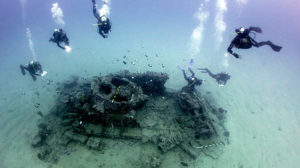2022-06-16 - 2022-06-26 ( )
Διά ζώσης
Η υποβολή αιτήσεων ολοκληρώνεται στις

Introduction
The Center for Education and Lifelong Learning of the Aristotle University of Thessaloniki welcomes you to the “Introduction to Applied Methods and Procedures for Underwater Surveying”, an 81-hour course that provides the basic knowledge and skills for the participation in an underwater scientific project.
This course is integrated in the ScienceDIVER training course which is developed and performed in the frame of the ScienceDiver EU Project. The ScienceDIVER training course is offered to master students and young researchers that want to improve their skills in the field of scientific diving. Scientific diving is a relevant asset of activities performed by scientists all over the world to study, preserve and promote the sea and the sea culture. Several public and private institutions are involved in these activities that cover biological, archaeological, engineering, and medical aspect of the research.
The Director of the Programme is Kimon Papadimitriou, Laboratory Teaching Staff at the School of Rural and Surveying Engineering / Dr Ing Rural and Surveying Engineering and Scuba Instructor, Coordinator of the ScienceDIVER project.
Applications are submitted online through the ScienceDIVER project webpage (https://www.sciencediver.eu/news-events/open-call-for-sciencediver-training-courses)
Participation fees/Discount
The course is provided for free thanks to the financial support of the SCIENCEDIVER Project www.sciencediver.eu) funded by the European Maritime and Fisheries Fund of the European Union. (Project id: 863674 – EMFF Blue Economy 2018 – Blue Careers).
Application
Applications are submitted online through the ScienceDIVER project webpage (https://www.sciencediver.eu/news-events/open-call-for-sciencediver-training-courses).
Contact
For further information, please contact the ScienceDIVER project coordinator at sciencediver@auth.gr.
Aim
The aim of this course is to provide the basic knowledge and the skills to those divers and researchers willing to participate in the preparation and the carrying out of underwater survey campaigns.
Objectives
Specific objectives of the course are:
Upon completion of the course, participants will:
Participant selection & Requirements
The course consists of three main sections. The first one relates to the knowledge development, the second one to the development of diving skills (dry and confined water sessions) and the third one to the practical application of developed knowledge and skills at open water conditions. After the completion of each section follows an assessment procedure.
The course is organized in 4 MODULES listed below. Each module includes theoretical lessons and diving and safety practice.
Module 1: General Diving Skills: how to fill scuba cylinders, including appropriate safety procedures; requirements on safe handling, storage and transportation of scuba cylinders; requirements for recurring cylinder testing; testing breathing gas quality; different types of scuba equipment configurations used in scientific diving operations and recognize the key features of each; basics of equipment maintenance. Risk-assessment: identifying site and task specific hazards; undertaking site and task-specific risk assessment; select appropriate measures to mitigate and/or control the risk
Module 2: Diving Safety: recognition of and response to emergency situations; effective emergency surface actions; casualty recovery from the water; communication with emergency services; documentation of the incident. First aid: training in first-aid and basic life support (BLSD) (e.g. cardiopulmonary resuscitation (CPR) and automated external defibrillation (AED)). Emergency oxygen administration: theoretical instruction of the medical principles involved and practical tuition on the use of an emergency oxygen unit.
Module 3: General Scientific Diving Techniques: ethics of science; sustainable practices in scientific diving in accordance with e.g. Nagoya-protocol, EN ISO 21416 & 21417; underwater tasks conducted by scientific divers; core roles involved in the administration of an organizations scientific Diving Safety Program. Methods: marking and measuring; line intercept transects; underwater photo and video camera use; airlifts and lift bags; mapping, sketching, drafting a map; visual and video census; quadrat/planning frame; offset measurements; sampling methods and devices; establishing a grid; measuring and characterization of abiotic variables; site marking and assessment; experimental design; collection, processing and evaluation and archiving data; creating a site report; aquatic life identification and biomonitoring, different cartography methods. Review of basic navigation skills: line work (knots, reels and spools), line survey, establishing transects and baselines, monitoring.
Module 4: Underwater Survey Techniques: Survey methods for accurate model scaling, photography and videography fundamentals, image editing and color correction for underwater images, photogrammetric survey planning, underwater photogrammetry techniques, photogrammetry pipeline, post-processing techniques for 3D models, 3D models analysis and measurements, 3D documentation and mapping, fundamentals of acoustic surveys, optoacoustic reconstructions, and data-merging.
The course provides participants with:
Evaluation of participants will be carried out in the following way:
Upon successful completion of the course, participants will be awarded a Certificate of Completion and the following certifications:
Participants, who have attended but not completed successfully, will be awarded a Certificate of Attendance.
For further information, please contact the ScienceDIVER project coordinator at sciencediver@auth.gr.
Μπορείτε να εγγραφείτε στο Newsletter για να μαθαίνετε πρώτοι για τα νέα προγράμματα του ΚΕΔΙΒΙΜ ΑΠΘ.